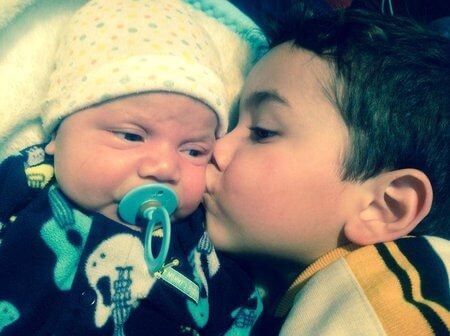Helping Children Overcome Jealousy Of A New Baby

Helping children overcome jealousy is a way to ensure that it doesn’t turn into anything more complicated. Jealousy is normal in children, but it can be worrying for parents, who can find it difficult to manage.
There are many reasons why a child may feel jealous, but the arrival of a new little brother or sister is one of the main ones.
Jealousy in children should not be seen as a negative. In fact, it is a reflection of the fact that the child feels attached to their family, and is worried about losing out on their parents’ love and affection. It is important to address these feelings nonetheless.
Although parents often worry about their children being jealous of a little brother or sister, most fail to prepare them before the new baby arrives. It is just as important to prevent jealousy as it is to alleviate these feelings once they occur.
Let’s reflect on a few ways to help children overcome jealousy and get over their fears.
How to make the adaptation process easier
We know that not all children react in the same way to a new sibling. Some will show jealousy and others will hide it. Some children won’t feel jealous at all.
For this reason, it is important to talk to children before their little brother or sister arrives, and help them to adapt to this change in their life.
Before the baby is born, your child should know about the changes that await. They might not have thought about how their life will change, so it’s important to tell them.
The care and attention that a newborn needs will take up a lot of your time and energy. Don’t let this take your child by surprise.
We can’t tell children how they should feel about the new baby. Be patient, understanding and tolerant in the face of their emotions. Your child may get over their jealousy quickly. Pay attention, but don’t worry too much about it.
Once the baby is home, your child will better understand what you have explained to them. Now is the time to help them adapt to the situation at hand.
Some families choose to limit or supervize contact between children until the older child’s emotional state has stabilized.
Helping children overcome jealousy

This process may not be easy. Children don’t change their minds quickly, particularly when they don’t receive the right guidance. Patience and love are key to helping children overcome jealousy.
To help older siblings get over their jealousy of the new baby, follow these tips that have helped many families:
- Encourage the older child to spend time with their little brother or sister. Let them hold the baby or touch them – always under supervision, of course.
- Ensure that when family and friends come to visit, they pay attention to your other child too, and don’t focus solely on the newborn.
- Avoid letting the baby take over the child’s space. Don’t make them give up their bedroom or personal space to the new baby.
- Give them one-to-one attention daily, to ensure they don’t feel excluded. Try to keep up some of the activities that you have always done together.
- Accept that they may regress to behavior typical of a younger child for a time, such as asking for a bottle. The best thing is to go along with these requests without showing much interest.
- Be affectionate with both children. Don’t neglect either of them. At the same time, don’t spoil the jealous older sibling, because they may get the idea that what they are doing is good.
- Try not to shout at your older child if they are playing a little too rough with the baby. Speak to them firmly and clearly about what is acceptable and what is not.
- Inviting the older sibling to take part in caring for the new baby can be a success. This will help them to bond with their little brother or sister. They will also begin to recognize that the baby has certain needs which require more attention.
- Your older child will appreciate it if you give them some kind of special privilege suitable for older kids.
Depending on how old the child is, they should be able to adapt fairly quickly to the presence of their new sibling. However, you should remain alert to inappropriate or excessive behavior.
Helping children overcome jealousy is a way to ensure that it doesn’t turn into anything more complicated. Jealousy is normal in children, but it can be worrying for parents, who can find it difficult to manage.
There are many reasons why a child may feel jealous, but the arrival of a new little brother or sister is one of the main ones.
Jealousy in children should not be seen as a negative. In fact, it is a reflection of the fact that the child feels attached to their family, and is worried about losing out on their parents’ love and affection. It is important to address these feelings nonetheless.
Although parents often worry about their children being jealous of a little brother or sister, most fail to prepare them before the new baby arrives. It is just as important to prevent jealousy as it is to alleviate these feelings once they occur.
Let’s reflect on a few ways to help children overcome jealousy and get over their fears.
How to make the adaptation process easier
We know that not all children react in the same way to a new sibling. Some will show jealousy and others will hide it. Some children won’t feel jealous at all.
For this reason, it is important to talk to children before their little brother or sister arrives, and help them to adapt to this change in their life.
Before the baby is born, your child should know about the changes that await. They might not have thought about how their life will change, so it’s important to tell them.
The care and attention that a newborn needs will take up a lot of your time and energy. Don’t let this take your child by surprise.
We can’t tell children how they should feel about the new baby. Be patient, understanding and tolerant in the face of their emotions. Your child may get over their jealousy quickly. Pay attention, but don’t worry too much about it.
Once the baby is home, your child will better understand what you have explained to them. Now is the time to help them adapt to the situation at hand.
Some families choose to limit or supervize contact between children until the older child’s emotional state has stabilized.
Helping children overcome jealousy

This process may not be easy. Children don’t change their minds quickly, particularly when they don’t receive the right guidance. Patience and love are key to helping children overcome jealousy.
To help older siblings get over their jealousy of the new baby, follow these tips that have helped many families:
- Encourage the older child to spend time with their little brother or sister. Let them hold the baby or touch them – always under supervision, of course.
- Ensure that when family and friends come to visit, they pay attention to your other child too, and don’t focus solely on the newborn.
- Avoid letting the baby take over the child’s space. Don’t make them give up their bedroom or personal space to the new baby.
- Give them one-to-one attention daily, to ensure they don’t feel excluded. Try to keep up some of the activities that you have always done together.
- Accept that they may regress to behavior typical of a younger child for a time, such as asking for a bottle. The best thing is to go along with these requests without showing much interest.
- Be affectionate with both children. Don’t neglect either of them. At the same time, don’t spoil the jealous older sibling, because they may get the idea that what they are doing is good.
- Try not to shout at your older child if they are playing a little too rough with the baby. Speak to them firmly and clearly about what is acceptable and what is not.
- Inviting the older sibling to take part in caring for the new baby can be a success. This will help them to bond with their little brother or sister. They will also begin to recognize that the baby has certain needs which require more attention.
- Your older child will appreciate it if you give them some kind of special privilege suitable for older kids.
Depending on how old the child is, they should be able to adapt fairly quickly to the presence of their new sibling. However, you should remain alert to inappropriate or excessive behavior.
All cited sources were thoroughly reviewed by our team to ensure their quality, reliability, currency, and validity. The bibliography of this article was considered reliable and of academic or scientific accuracy.
- Ainsworth, M.D.S. (1989). Atachment beyond infancy. American Psychology, 44, 709-716.
- Arranz Freijo, E. (2000). Interacción entre hermanos y desarrollo psicológico: una propuesta educativa. https://minerva.usc.es/xmlui/bitstream/handle/10347/5181/pg_313-334_inneduc10.pdf?sequence=1
- Howe, N. y Recchia, H. (2014). Las relaciones entre hermanos y su impacto en el desarrollo de los niños. Concordia University, Canadá. Recuperado de: http://www.enciclopedia-infantes.com/sites/default/files/textes-experts/es/2592/las-relaciones-entre-hermanos-y-su-impacto-en-el-desarrollo-de-los-ninos.pdf
- Velasco, T. (2011). Conociendo un poco más el apego. Pedagogía Magna.
This text is provided for informational purposes only and does not replace consultation with a professional. If in doubt, consult your specialist.








